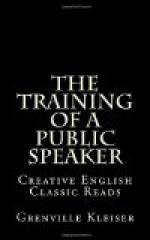In the declamatory exercises of schools it would be expedient, likewise, to move the passions and imagine the scene as a real one in life, and it is the more important as there the part is performed rather of a pleader against some person, than an advocate for some person. We represent a person who has lost his children, or has been shipwrecked, or is in danger of losing his life, but of what significance is it to personate such characters, unless we also assume their real sentiments. This nature, and these properties of the passions, I thought it incumbent on me not to conceal from the reader, for I, myself, such as I am, or have been (for I flatter myself that I have acquired some reputation at the bar), have often been so affected that not only tears, but even paleness, and grief, not unlike that which is real, have betrayed my emotions.
THE STUDY OF WORDS
What now follows requires special labor and care, the purpose being to treat of elocution, which in the opinion of all orators is the most difficult part of our work, for M. Antonius says that he has seen many good speakers, but none eloquent. He thinks it good enough for a speaker to say whatever is necessary on a subject, but only the most eloquent may discuss it with grace and elegance. If down to the time he lived in, this perfection was not discoverable in any orator, and neither in himself nor in L. Crassus, it is certain that it was lacking in them and their predecessors only on account of its extreme difficulty. Cicero says that invention and disposition show the man of sense, but eloquence the orator. He therefore took particular pains about the rules for this part, and that he had reason for so doing the very name of eloquence sufficiently declares. For to be eloquent is nothing else than to be able to set forth all the lively images you have conceived in your mind, and to convey them to the hearers in the same rich coloring, without which all the principles we have laid down are useless, and are like a sword concealed and kept sheathed in its scabbard.
This, then, is what we are principally to learn; this is what we can not attain without the help of art; this ought to be the object of our study, our exercise, our imitation; this may be full employment for our whole life; by this, one orator excels another; and from this proceeds diversity of style.
THE PROPER VALUE OF WORDS
It should not be inferred from what is said here that all our care must be about words. On the contrary, to such as would abuse this concession of mine, I declare positively my disapprobation of those persons who, neglecting things, the nerves of causes, consume themselves in a frivolous study about words. This they do for the sake of elegance, which indeed is a fine quality when natural but not when affected. Sound bodies, with a healthy condition of blood, and




